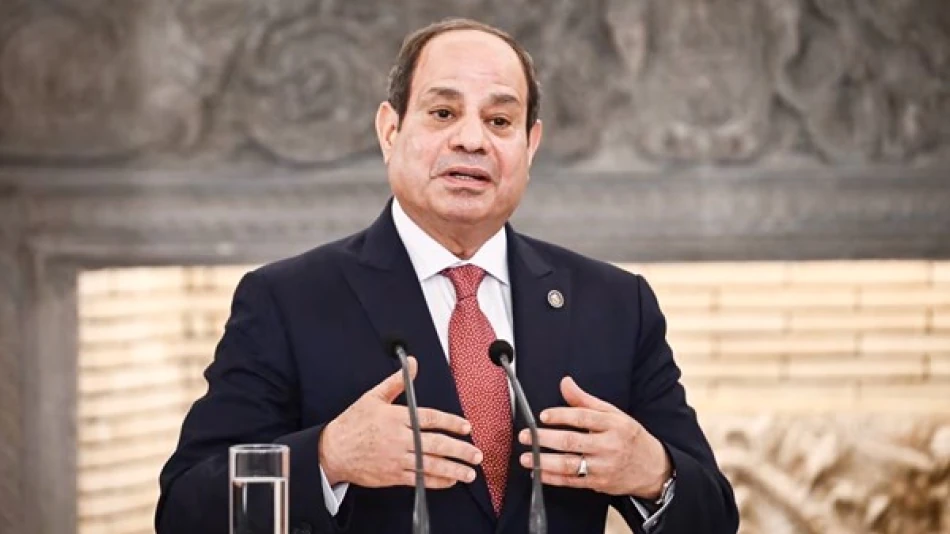
Egypt's Mediation Crucial for Gaza Ceasefire, Says President Sisi
Egypt Doubles Down on Gaza Mediation as US Military Ties Deepen
Egyptian President Abdel Fattah el-Sisi has reinforced his country's central role in Gaza ceasefire negotiations during high-level talks with America's top regional military commander, signaling Cairo's determination to remain the key Arab mediator despite months of stalled diplomacy. The meeting underscores how Egypt leverages its unique position—bordering Gaza and maintaining ties with all parties—to strengthen strategic partnerships while addressing the region's most intractable conflict.
Cairo's Diplomatic Gambit Continues
During Monday's meeting with General Brad Cooper, commander of U.S. Central Command, Sisi emphasized the trilateral mediation efforts between Egypt, the United States, and Qatar aimed at securing a Gaza ceasefire, prisoner exchanges, and humanitarian aid access. This represents Egypt's latest push to break the deadlock that has persisted since the brief November 2023 truce collapsed.
Egypt's mediation strategy serves multiple purposes beyond humanitarian concerns. As the first Arab nation to sign a peace treaty with Israel in 1979, Egypt has positioned itself as the indispensable broker—a role that brings significant diplomatic capital and reinforces its relationship with Washington. The ongoing crisis has allowed Cairo to demonstrate its regional relevance at a time when Gulf states like Saudi Arabia and the UAE have emerged as alternative U.S. partners in the Middle East.
Strategic Partnership Under Regional Pressure
The timing of Cooper's visit is significant. Egypt faces mounting economic pressures, with inflation and currency devaluation straining public resources, while managing the spillover effects of conflicts in Gaza, Sudan, and Libya. Maintaining strong U.S. ties—and the $1.3 billion in annual military aid that comes with them—remains crucial for Egypt's stability.
Military Cooperation as Diplomatic Currency
Sisi's reference to the upcoming "Bright Star 2025" military exercises reveals how Egypt uses defense cooperation to cement broader strategic relationships. These biennial exercises, first launched in 1981, represent one of the largest U.S. military training operations outside NATO. For Egypt, hosting such exercises demonstrates its value as a regional security partner while providing its military with advanced training and equipment access.
Regional Containment Strategy
The discussions extended beyond Gaza to address broader regional tensions, reflecting both countries' concerns about escalation across multiple fronts. Egypt's geographic position makes it vulnerable to instability in Libya, Sudan, and the Red Sea shipping lanes—areas where U.S. interests also face threats from various militant groups and Iranian proxies.
Egypt's approach contrasts with other regional mediators. While Qatar has used its financial resources and Hamas connections to facilitate dialogue, and Turkey has leveraged its NATO membership and regional ambitions, Egypt offers something unique: direct border control with Gaza and established relationships with both Israeli security services and Palestinian factions.
Market and Geopolitical Implications
For investors and regional governments, Egypt's continued mediation efforts signal several key trends. First, the persistence of diplomatic engagement suggests that despite public pessimism, behind-the-scenes negotiations remain active. Second, Egypt's emphasis on "sustainable de-escalation" indicates recognition that temporary ceasefires without addressing underlying issues have proven ineffective.
The focus on humanitarian aid access also has economic implications. Egypt controls the Rafah crossing, Gaza's primary non-Israeli entry point, giving Cairo significant leverage over reconstruction efforts and future economic arrangements. Any eventual resolution will likely require Egypt's cooperation in monitoring and implementing agreements—a role that could bring both responsibilities and opportunities.
Most Viewed News

 Layla Al Mansoori
Layla Al Mansoori






